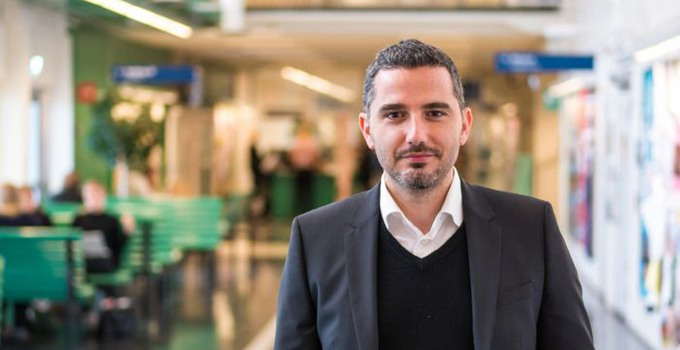
Aryo Makko is professor of history at Stockholm University, where he was involved in establishing the Hans Blix Center for the History of International Relations.Photo: Anders Ståhlberg/Stockholm University.
"Knowledge of history provides a better understanding of the present"
Aryo Makko is the new Visiting Professor of Military History at the Swedish Defence University. His research focuses on the history of international relations in the 19th and 20th centuries, with a particular emphasis on the Cold War.
"I have always been interested in history. When I was a child, it was primarily archaeological excavations that attracted me, but over time, I became more and more interested in why the world looks the way it does, and that is largely explained by history," says Aryo Makko.
He was also influenced by his childhood in Germany, where the country's reunification in 1990 was a major event following the Cold War and the fall of the Berlin Wall.
"It's fascinating how the thinking and actions of relatively few people set the framework for all of us. It also shows the importance of diplomacy, politics, and international relations," says Aryo Makko.
"The world we live in has evolved from the foundation that the Cold War left behind, and there is still much to explore for us to understand our current times and contemporary history," he continues.
Exploring contemporary history
Choosing a research career came naturally given his interest in history.
"I have long been fascinated by the journey of discovery that we are on, and I realized quite early that this is what research—in the best of worlds—is about. That is, through research, gaining new insights and contributing new knowledge."
He received his PhD in history from Stockholm University in 2012 with the thesis "Advocates of Realpolitik: Sweden, Europe and the Helsinki Final Act," in which he analyzes Sweden's role in the European Security Conference (CSCE - later OSCE), and the country's contributions to the political and diplomatic process that led to the Helsinki Final Act of 1975.
He is currently working on a book project about the relations between Europe's neutral states and the Soviet Union during the period 1960–1991.
"The purpose of the project is to deepen our knowledge of that time and offer today's policymakers historical expertise on how their predecessors in neutral countries and in Moscow viewed small states and handled various types of neutrality policies."
He emphasizes that knowledge of contemporary history is a prerequisite for a deeper and better understanding of current situations. As an example, he points to the disarmament that followed the fall of the Berlin wall and the ideas about the end of history that characterized that time.
"Today, many believe it was crazy that we let our guard down, but if we go back to history, we get a better understanding of how it could happen. There were great international hopes for Russia's opportunities to integrate with the West, and we in Sweden were not the only ones who dismantled defense at the beginning of the 2000s."
Developing the research environment in military history
As a visiting professor at the relatively new Department of Military History at the Swedish Defence University, he wants to help develop the research environment.
"It's an exciting environment that has expanded rapidly in recent years. I hope that we can continue to develop to integrate more fully into the Swedish and international historical landscape. This includes, among other things, strengthening our ties to historians at other institutions without losing our identity, and focus on the unique aspects of this environment at the intersection of the civilian and military."
Aryo Makko comes most recently from a position as professor of history at Stockholm University, where he helped establish the Hans Blix Center for the History of International Relations.
"I have been the head of the center since 2020, and I also have experiences from longer guest researcher stays in Switzerland, the United Kingdom, and the USA, which I believe can provide new perspectives and contacts."
He has also served as a member of the Swedish Research Council's review panel for historical sciences and archaeology, as well as leadership roles and work in various bodies, such as the research policy committee of Sweden's Young Academy.
"I have also recently held a Pro Futura scholarship, which is an excellence initiative from the Bank of Sweden Tercentenary Foundation and the Swedish Collegium for Advanced Study, and I would like to help nominate young researchers there, for example."
Filling gaps in Swedish historical research
In a broader perspective, he also wants to help ensure that issues of war and peace are placed higher on the agenda of historical researchers.
"There are major gaps in Swedish historical research, for example, about Sweden's bilateral relations with the USA, the Soviet Union and later Russia, and about Sweden's path to EU membership and participation in international organizations. Even the modern history of the Swedish defense needs to be further analyzed from historical perspectives. There are many archives waiting to be explored, and I hope to contribute to that work," he says.
Josefin Svensson
At a glance
At the Swedish Defence University since: April 1, 2024.
Currently: New visiting professor of military history at the Swedish Defence University.
When I´'m off duty:
– I prefer to spend time with my children (nine and six years old).
Last read book:
– Die Totengräber: Der letzte Winter der Weimarer Republik by R. Barth och H. Friederichs.
Hidden talent:
– I'm good with numbers – for instance, I memorize credit card numbers just for fun...
Happy to discuss:
– Politics and soccer.
My motivation as a researcher:
– Curiosity.
More about
Page information
- Published:
- 2024-06-07
- Last updated:
- 2024-06-07
